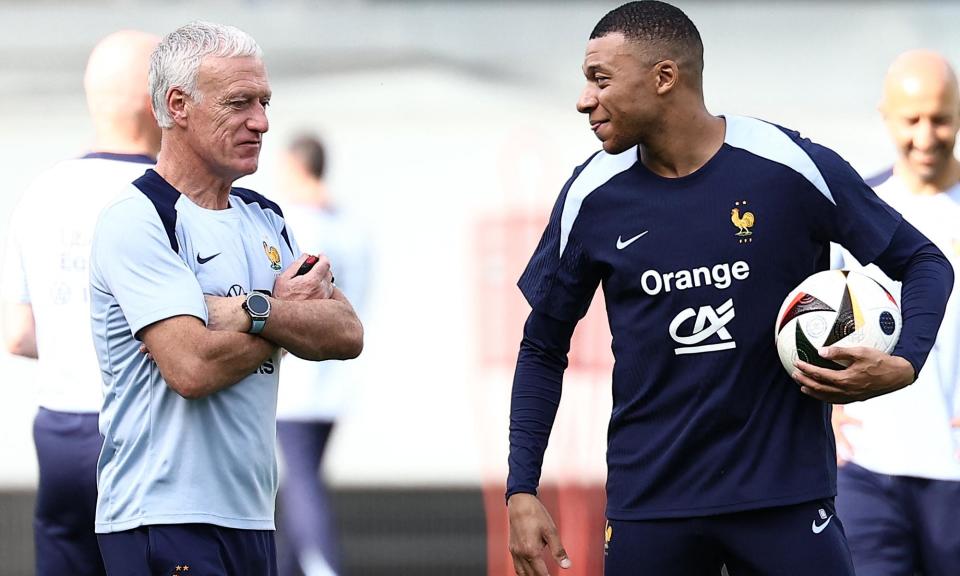France’s paradox: Kylian Mbappé is the reason for Deschamps’ caution

When some teams are dull and unimpressive, it is because they are dull and unimpressive. When France are dull and unimpressive, it is because they are managing the tournament. With a World Cup triumph, plus defeats in another World Cup final and a European Championship final under his belt as head coach, Didier Deschamps has earned that sympathy.
Portugal’s success at Euro 2016 and France’s at the 2018 World Cup are the examples on which Gareth Southgate has to a large degree based his philosophy. Keep it tight, reduce as much as possible the possibility of the opposition scoring and rely on the excellence of the forward players to win the margins. Deschamps clearly learned a lot under Marcelo Lippi at Juventus, but in his approach to tournaments he follows Aimé Jacquet, under whom he captained France to the World Cup in 1998.
Related: Kylian Mbappé is back but he needs help if France are to win Euro 2024
Is it fair to wonder whether, given the players at his disposal, Deschamps might have produced more exciting football? His record, perhaps, is justification enough – which should perhaps give pause to the handbrake-off legions who condemn Southgate. The problem with the approach is that it leaves no room for failure: even in victory you wonder which bit of Euro 2016 gets replayed on Portuguese TV. Did they really spend lockdown watching the run-of-the-mill 2-0 semi-final win against Wales, their only victory in normal time in the tournament?
Yet there is a paradox here. How the theory goes, can France be so bad to watch when they have Kylian Mbappé, arguably the most electrifying player in the world in possession? Surely after 12 years in charge, the usual excuse made by national coaches that they don’t have the time to inculcate their system no longer applies to Deschamps, or at least not to the same extent? Could he not have imposed a system a little more sophisticated than grinding it out and waiting for Mbappé to do something?
But the reason Deschamps cannot impose a complex system of pressing is Mbappé. The 25-year-old is brilliant, lightning fast, technically supreme and a superb finisher, but he is also a problem for France. Between scoring his second goal against Poland in the last 16 and scoring a hat-trick in the final, he did almost nothing at the World Cup.
That’s an absurd sentence, obviously; the sort of thing that can only be said of a prodigiously gifted player. But Kyle Walker marked him out of the game in the quarter-final, when Bukayo Saka was England’s most dangerous player, regularly getting a run at Theo Hernández, who was left isolated by the lack of support Mbappé gave him on that flank. Although Aurélien Tchouaméni scored on pretty much the only occasion Walker crossed the halfway line, it’s impossible not to wonder what havoc night have been wreaked had England been more prepared to call Mbappé’s bluff and allow Walker to surge forward.
Morocco were not constrained in the same way in the semi-final, and such was the impact of their right-back Achraf Hakimi that Mbappé had to be moved off the left flank and into the centre. It was a similar story in the final, when Nahuel Molina and Rodrigo De Paul dominated the flank so much that Mbappé had to be shifted into the centre at half-time, with Marcus Thuram coming on to present a more reliable defensive option.
Mbappé converted two penalties and scored a stunning volley to force penalties, but France might not have needed those heroics, Argentina might not have been 2-0 up and dominant at half-time, had it not been for the imbalance Mbappé causes. It’s a curiosity of the modern age, when so much football is so systematised, that the celebrity star has reasserted himself, absolved of responsibility, forcing others to compensate and so compromising the team’s internal mechanisms. That is why Mbappé started at centre-forward in the group stage here, but he is at his most dangerous coming off the left and returned there for the final half-hour against Poland.
Could Belgium take advantage on Monday? It feels unlikely, given how sluggish, how incoherent, how like England they have appeared so far. Romelu Lukaku continues to seem more likely to step on a rake than to take a chance, Kevin De Bruyne has been visibly frustrated and Domenico Tedesco seems uncertain what his best option is in wide areas.
In addition, Belgium’s limp performance in the 2018 World Cup semi-final, the last time they met in a major tournament, seemed indicative not only of France’s solidity but also an inferiority complex that has endured since Michel Platini scored a hat-trick in France’s 5-0 win against them at Euro 84. Belgium haven’t beaten their neighbours in a competitive game since.
But if Belgium are brave enough to take advantage of the fact France effectively defend a man down, there is just a chance they could turn France’s greatest strength against themselves.

 Yahoo Sport
Yahoo Sport 






































